
Legal & Planning 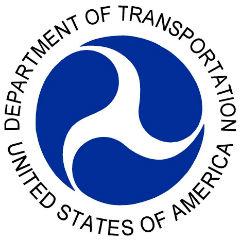 To ensure that people with disabilities would not be discriminated against in air travel, Congress passed the Air Carrier Access Act (ACAA, 14 CFR 382). Under the ACAA, all domestic and international flights with the US as its destination or origination are required to provide certain accommodations, free of charge, to people with disabilities in a way consistent with providing safe travel for all passengers.
Understanding what accommodations are available and what the airline is and is not allowed to do is an important step in being able to advocate for your rights as a passenger.
To ensure that people with disabilities would not be discriminated against in air travel, Congress passed the Air Carrier Access Act (ACAA, 14 CFR 382). Under the ACAA, all domestic and international flights with the US as its destination or origination are required to provide certain accommodations, free of charge, to people with disabilities in a way consistent with providing safe travel for all passengers.
Understanding what accommodations are available and what the airline is and is not allowed to do is an important step in being able to advocate for your rights as a passenger.
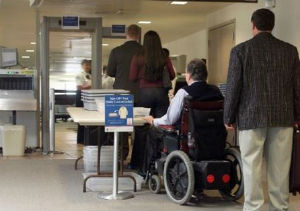 Security screening for people with disabilities should be the same as any other passenger...with some exceptions. The TSA says, “…anyone who cannot stand with their arms raised at shoulder level for the 5-7 second duration of the scan; anyone who is not able to stand without the use of a cane, crutch, walker, etc.; people who use service animals; people using or carrying oxygen; and individuals accompanying and providing assistance to those individuals will be screened using alternate screening techniques including pat-downs."
Some additional guidelines from the TSA include:
Security screening for people with disabilities should be the same as any other passenger...with some exceptions. The TSA says, “…anyone who cannot stand with their arms raised at shoulder level for the 5-7 second duration of the scan; anyone who is not able to stand without the use of a cane, crutch, walker, etc.; people who use service animals; people using or carrying oxygen; and individuals accompanying and providing assistance to those individuals will be screened using alternate screening techniques including pat-downs."
Some additional guidelines from the TSA include:
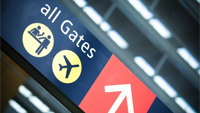 You are free to move about the terminal, airline personnel cannot keep people with disabilities in terminals or require them to remain in a holding area during delays or while waiting for transportation assistance.
Getting through security can be difficult, especially for people traveling with service animals or assistive devices. When traveling, give yourself plenty of time. If you need assistance, let the airline personnel at the gate know. The gate personnel are required to give you all the information that is given to other passengers, including information about boarding times, delays, or changes in gate assignments. By making sure the gate workers are aware of your presence, you can be proactive in helping them make sure you get the information you need.
You are free to move about the terminal, airline personnel cannot keep people with disabilities in terminals or require them to remain in a holding area during delays or while waiting for transportation assistance.
Getting through security can be difficult, especially for people traveling with service animals or assistive devices. When traveling, give yourself plenty of time. If you need assistance, let the airline personnel at the gate know. The gate personnel are required to give you all the information that is given to other passengers, including information about boarding times, delays, or changes in gate assignments. By making sure the gate workers are aware of your presence, you can be proactive in helping them make sure you get the information you need.
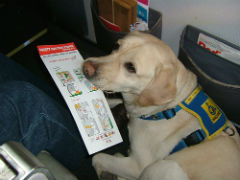 Service animals must be allowed to accompany a person with a disability on the flight. This includes service animals that provide purely emotional support, however, service animals for purely emotional support must have documentation from a mental health or medical provider. Other service animals are not required to have documentation but the airline is permitted to ask questions to make sure the animal is not just a pet.
While the general rule is that the service animal be allowed on the flight, if there is no space to fit the animal without blocking aisles, exits or another passenger’s seat, then airline personnel must first try to accommodate the animal and passenger in a different seat within the same cabin (for example in the bulkhead) before having the animal travel in the cargo-hold.
There are many rules for traveling with service animals that go beyond this article. (See Appendix VI for more information).
Service animals must be allowed to accompany a person with a disability on the flight. This includes service animals that provide purely emotional support, however, service animals for purely emotional support must have documentation from a mental health or medical provider. Other service animals are not required to have documentation but the airline is permitted to ask questions to make sure the animal is not just a pet.
While the general rule is that the service animal be allowed on the flight, if there is no space to fit the animal without blocking aisles, exits or another passenger’s seat, then airline personnel must first try to accommodate the animal and passenger in a different seat within the same cabin (for example in the bulkhead) before having the animal travel in the cargo-hold.
There are many rules for traveling with service animals that go beyond this article. (See Appendix VI for more information).
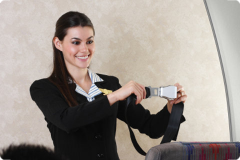 Airline personnel must provide a safety briefing to people with disabilities. All trip information, including the safety briefing, that is made available to other passengers must also be made available to passengers with disabilities.
Airline personnel may offer an individual briefing to a person whose disability keeps him or her from receiving the information presented in the general briefing. The individual briefing must be provided as inconspicuously and discretely as possible, for example when a person pre-boards.
Airline personnel may not ‘quiz’ the person about material presented in the safety briefing, except to the same degree they quiz all passengers about it.
In-flight accommodations
Airline personnel must assist a passenger with a disability to:
Airline personnel must provide a safety briefing to people with disabilities. All trip information, including the safety briefing, that is made available to other passengers must also be made available to passengers with disabilities.
Airline personnel may offer an individual briefing to a person whose disability keeps him or her from receiving the information presented in the general briefing. The individual briefing must be provided as inconspicuously and discretely as possible, for example when a person pre-boards.
Airline personnel may not ‘quiz’ the person about material presented in the safety briefing, except to the same degree they quiz all passengers about it.
In-flight accommodations
Airline personnel must assist a passenger with a disability to:
Air Travelers with Disabilities: Here are your rights
Traveling by plane can be stressful for anyone―the long wait, the security hassles, lost luggage. But the process can be even more grueling for people with disabilities. Recently, news outlets have reported on the unfortunate situation when airlines refuse travel to people with disabilities. While no one is suggesting that the airlines are acting intentionally, it is clear that a great deal more awareness and advocacy is needed. This post provides basic information on the rights of airline passengers with disabilities and offers some tips on how to navigate the process.The Air Carrier Access Act
 To ensure that people with disabilities would not be discriminated against in air travel, Congress passed the Air Carrier Access Act (ACAA, 14 CFR 382). Under the ACAA, all domestic and international flights with the US as its destination or origination are required to provide certain accommodations, free of charge, to people with disabilities in a way consistent with providing safe travel for all passengers.
Understanding what accommodations are available and what the airline is and is not allowed to do is an important step in being able to advocate for your rights as a passenger.
To ensure that people with disabilities would not be discriminated against in air travel, Congress passed the Air Carrier Access Act (ACAA, 14 CFR 382). Under the ACAA, all domestic and international flights with the US as its destination or origination are required to provide certain accommodations, free of charge, to people with disabilities in a way consistent with providing safe travel for all passengers.
Understanding what accommodations are available and what the airline is and is not allowed to do is an important step in being able to advocate for your rights as a passenger.
Your Accommodation,Your Choice
First off, it is important to keep in mind that just because an airline offers you an accommodation, that does not mean you have to accept it. For example, airlines must allow (but may not force) a person with a disability to pre-board the plane. However, if you request an accommodation that is required by law, the airline must provide it to you, free of charge.Before The Trip
Pre-Flight Notifications
Pre-flight notification to the airline is generally not required. People with disabilities do not need to tell the airline ahead of time that he or she plans on flying, except under certain specific circumstances. These circumstances include traveling by stretcher, traveling with an electronic wheelchair or other device with special batteries, or requiring a hook-up to the airline’s oxygen system during flight. If none of these conditions apply to you, the airline may not deny you travel for failing to tell them ahead of time.Traveling with an attendant
Traveling with an attendant is generally not required. Airlines may require a person with a disability to travel with an attendant (someone to help the person during the flight in case of an emergency) only if the airline staff determines the person:- Is unable to comprehend or respond appropriately to safety instructions;
- Has a mobility impairment so severe that the person is unable to assist in his or her own evacuation from the aircraft; or
- Has both severe hearing and severe vision impairments which prevent him or her from receiving instructions from in-flight personnel.
The need for a medical certificate
A medical certificate is generally not required. A medical certificate is a written statement from the passenger’s physician saying that the passenger is capable of completing the flight safely without requiring extraordinary medical care. Simply having a disability is not a reason for an airline to request a medical certificate unless the person:- Is on a stretcher or in an incubator;
- Needs medical oxygen during flight; or
- Has a medical condition which causes the airline to have reasonable doubt that the person can complete the flight safely, without requiring extraordinary medical assistance.
Navigating the Airport: Through Security and Beyond
Airport Escorts
Airport escorts should be available. An airline may provide a qualified employee or allow an unticketed parent or assistant to help a person with a disability through security. Unticketed passengers can request a permit from the airline’s check-in counter that will allow him or her to pass through security with the person they are assisting.Security Screenings
 Security screening for people with disabilities should be the same as any other passenger...with some exceptions. The TSA says, “…anyone who cannot stand with their arms raised at shoulder level for the 5-7 second duration of the scan; anyone who is not able to stand without the use of a cane, crutch, walker, etc.; people who use service animals; people using or carrying oxygen; and individuals accompanying and providing assistance to those individuals will be screened using alternate screening techniques including pat-downs."
Some additional guidelines from the TSA include:
Security screening for people with disabilities should be the same as any other passenger...with some exceptions. The TSA says, “…anyone who cannot stand with their arms raised at shoulder level for the 5-7 second duration of the scan; anyone who is not able to stand without the use of a cane, crutch, walker, etc.; people who use service animals; people using or carrying oxygen; and individuals accompanying and providing assistance to those individuals will be screened using alternate screening techniques including pat-downs."
Some additional guidelines from the TSA include:
- If the passenger requests a private screening, the airline must provide it in time for the passenger to board his or her flight.
- If an individual with a disability is able to pass through the security system without activating it, the person shall not be subject to special screening procedures.
- If an individual with a disability is not able to pass through the system without activating it, the person will be subject to further screening in the same manner as any other passenger activating the system.
In the terminal
 You are free to move about the terminal, airline personnel cannot keep people with disabilities in terminals or require them to remain in a holding area during delays or while waiting for transportation assistance.
Getting through security can be difficult, especially for people traveling with service animals or assistive devices. When traveling, give yourself plenty of time. If you need assistance, let the airline personnel at the gate know. The gate personnel are required to give you all the information that is given to other passengers, including information about boarding times, delays, or changes in gate assignments. By making sure the gate workers are aware of your presence, you can be proactive in helping them make sure you get the information you need.
You are free to move about the terminal, airline personnel cannot keep people with disabilities in terminals or require them to remain in a holding area during delays or while waiting for transportation assistance.
Getting through security can be difficult, especially for people traveling with service animals or assistive devices. When traveling, give yourself plenty of time. If you need assistance, let the airline personnel at the gate know. The gate personnel are required to give you all the information that is given to other passengers, including information about boarding times, delays, or changes in gate assignments. By making sure the gate workers are aware of your presence, you can be proactive in helping them make sure you get the information you need.
On the Plane
Help with boarding and deplaning
Properly trained staff must be available to help people with disabilities board and exit the plane. The airport must have properly trained personnel available to help persons with a disability in boarding and exiting the plane. However, airlines are not permitted to hand-carry passengers on and off aircraft, i.e., to directly pick up a passenger’s body in the arms of airline personnel.Seat Assignments
Seating choices cannot be made on the basis of disability except where FAA rules require it. An individual with a disability cannot be required to sit in a particular seat or be excluded from any seat, except as provided by FAA safety rules, such as the FAA Exit Row Seating rule. For safety reasons, that rule limits seating in exit rows to those persons with the most potential to be able to operate the emergency exit and help in an aircraft evacuation.Bringing Service animals on board
 Service animals must be allowed to accompany a person with a disability on the flight. This includes service animals that provide purely emotional support, however, service animals for purely emotional support must have documentation from a mental health or medical provider. Other service animals are not required to have documentation but the airline is permitted to ask questions to make sure the animal is not just a pet.
While the general rule is that the service animal be allowed on the flight, if there is no space to fit the animal without blocking aisles, exits or another passenger’s seat, then airline personnel must first try to accommodate the animal and passenger in a different seat within the same cabin (for example in the bulkhead) before having the animal travel in the cargo-hold.
There are many rules for traveling with service animals that go beyond this article. (See Appendix VI for more information).
Service animals must be allowed to accompany a person with a disability on the flight. This includes service animals that provide purely emotional support, however, service animals for purely emotional support must have documentation from a mental health or medical provider. Other service animals are not required to have documentation but the airline is permitted to ask questions to make sure the animal is not just a pet.
While the general rule is that the service animal be allowed on the flight, if there is no space to fit the animal without blocking aisles, exits or another passenger’s seat, then airline personnel must first try to accommodate the animal and passenger in a different seat within the same cabin (for example in the bulkhead) before having the animal travel in the cargo-hold.
There are many rules for traveling with service animals that go beyond this article. (See Appendix VI for more information).
Special Safety Briefing
 Airline personnel must provide a safety briefing to people with disabilities. All trip information, including the safety briefing, that is made available to other passengers must also be made available to passengers with disabilities.
Airline personnel may offer an individual briefing to a person whose disability keeps him or her from receiving the information presented in the general briefing. The individual briefing must be provided as inconspicuously and discretely as possible, for example when a person pre-boards.
Airline personnel may not ‘quiz’ the person about material presented in the safety briefing, except to the same degree they quiz all passengers about it.
In-flight accommodations
Airline personnel must assist a passenger with a disability to:
Airline personnel must provide a safety briefing to people with disabilities. All trip information, including the safety briefing, that is made available to other passengers must also be made available to passengers with disabilities.
Airline personnel may offer an individual briefing to a person whose disability keeps him or her from receiving the information presented in the general briefing. The individual briefing must be provided as inconspicuously and discretely as possible, for example when a person pre-boards.
Airline personnel may not ‘quiz’ the person about material presented in the safety briefing, except to the same degree they quiz all passengers about it.
In-flight accommodations
Airline personnel must assist a passenger with a disability to:
- Move to and from seats as a part of the boarding and exiting process.
- Open packages and identify food (although assistance with actual eating is not required).
- Use an on-board wheelchair when available to enable the passenger to move to and from the lavatory.
- Move to and from the lavatory (as long as this does not require lifting or carrying by the airline employee).
- Load and retrieve carry-on items, including mobility aids and other assistive devices stowed on board the aircraft.
Enforcing Your Rights
The airline may refuse transportation if a person would endanger the health or safety of other passengers, or transporting the person would be a violation of FAA safety rules. Keep in mind this can apply to someone who airline personnel determine is unable to assist themselves. Generally, airline personnel may not ask what specific disability the person has, but they can ask questions about a person’s ability to perform specific air travel-related functions, such as boarding, deplaning, or walking through the airport. Admitting that you have difficulty with one or more of these tasks also does not allow the airline to deny you travel. Rather, the airline must be able to tell you how the safety of all passengers would be affected by your presence on the flight. Unfortunately, the airline does not have to give you such a response until after your day of travel. If you feel the airline is not following the law and discussing the problem with airline personnel has not resolved the issue, there are other steps you can take.1. Ask to speak with the CRO
All airlines are required to have a Complaints Resolution Official (CRO) immediately available (even if by phone) to resolve disagreements. You are entitled to talk with a CRO, who has authority to resolve complaints on behalf of the airline, if you feel the airline is not following the ACAA rules.2. Ask the CRO to confirm his/her decision with the pilot
Discussing the situation with the CRO is the best way to resolve issues and ultimately, the pilot has the final say when it comes to issues of passenger safety. Asking the CRO to confirm his or her decision with the pilot can add another layer of protection for you.3. Contact the Department of Transportation
If you are still not satisfied with the airline’s response, you may contact the Department of Transportation’s consumer protection hotline at 1-800-778-4838 (voice) or 1-800-455-9880 (TTY). The most important thing is to know your rights before you fly and to keep your cool. Making sure to plan ahead and allow plenty of time for accommodations to be made can also help make the flying experience more enjoyable.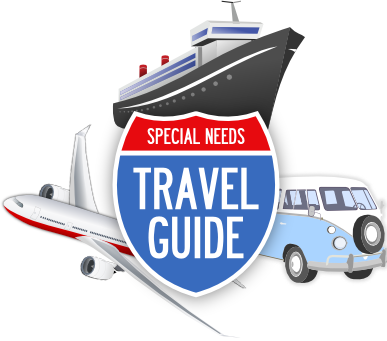 This above post is part of a nine part series on disability travel. Here are the other posts in this series.
This above post is part of a nine part series on disability travel. Here are the other posts in this series.



